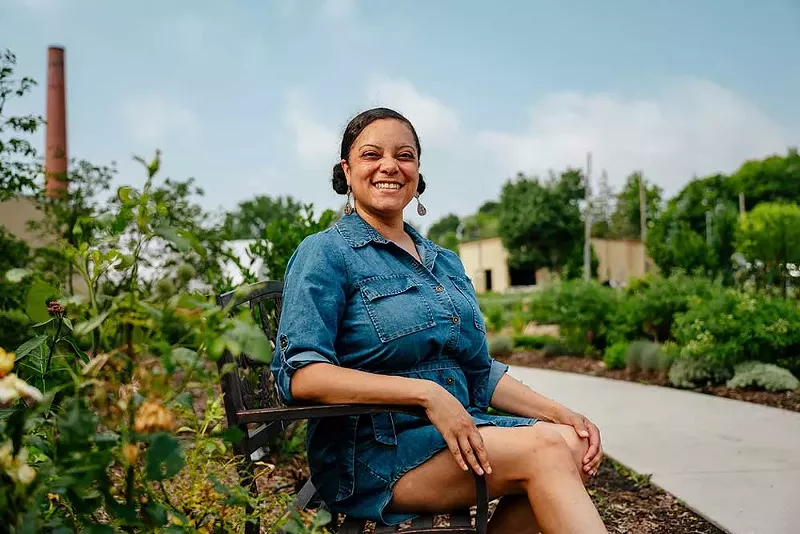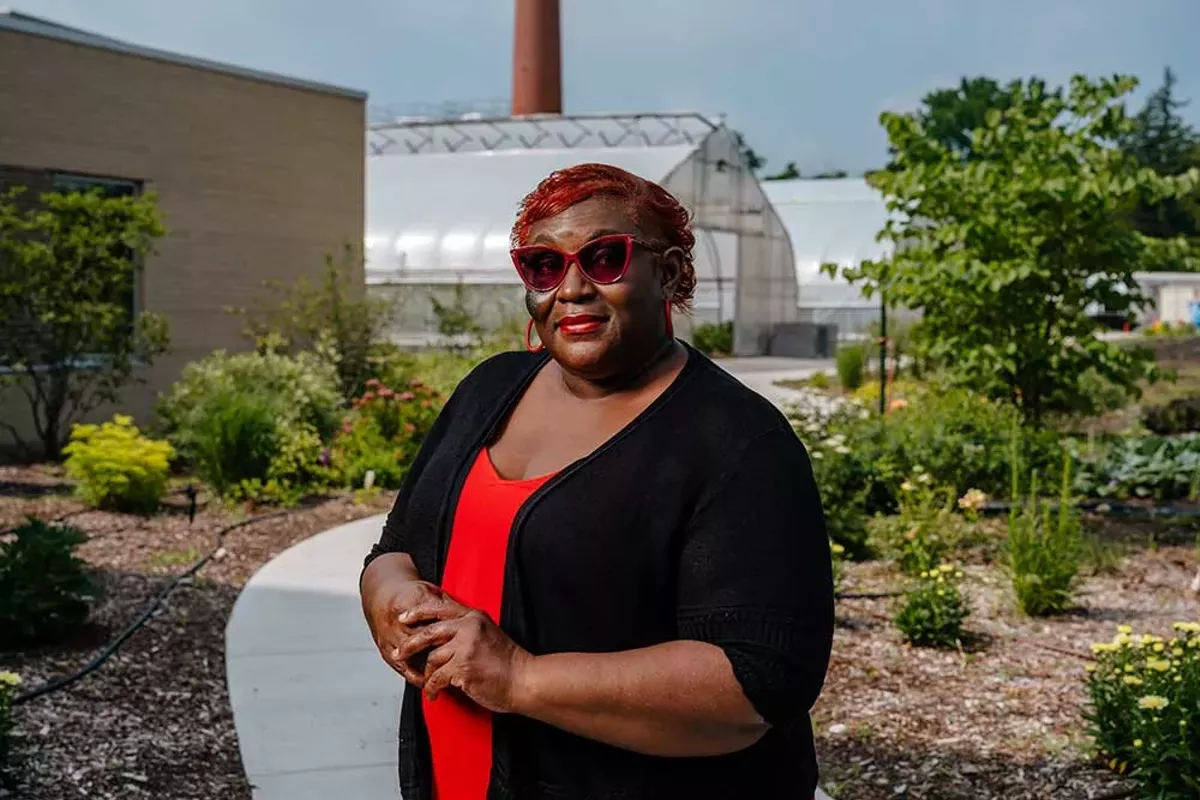Overview:
- In Michigan, community health workers are vital lifelines, helping residents secure food, housing, and healthcare amid looming Medicaid cuts.
- At Trinity Health, 48 CHWs assist with applications for food and cash aid, Medicaid navigation, and preventing utility shutoffs.
- Yet, with federal cuts threatening coverage for 700,000 Michiganders, this essential safety net is at risk, highlighting the precarious balance of support systems in the face of state funding reductions.
Underwritten by:

Read our entire series on Community Health Workers here>>>
Regina Gully knows what it’s like to need help and not know where to turn. Now, as a community health worker with Trinity Health, she spends her days making sure others don’t have to feel that way.
“We treat everyone with kindness and respect,” she said. “Because there’s a stigma that comes with needing assistance. We’ve been there.”
In her role, Gully assists people in applying for food and cash assistance, navigating Medicaid, avoiding utility shutdowns, and maintaining their housing. One client she’s worked with for years, Shanon Seymore, was facing eviction, health crises, and deep depression when they first met. “
“She was ready to give up,” Gully recalled. “But I wasn’t going to let that happen.”
Federal Medicaid cuts threaten to unravel much of this safety-net work. With an estimated 700,000 Michiganders at risk of losing coverage and billions in state funding cuts now signed into law, programs that rely on Medicaid-linked referrals and services face new uncertainty
Gully is one of 48 community health workers employed across Trinity Health Michigan. Between January and early May of this year alone, CHWs across the system received referrals for nearly 2,900 individuals. The needs vary — food insecurity, transportation, Medicaid enrollment, utility shutoffs — but one issue stands out.
“Housing,” Gully said. “It’s the biggest thing. There’s such a lack of affordable housing. That’s where people get stuck.”
Each CHW at Trinity manages a caseload of up to 50 clients at a time. Some referrals come from recent hospital stays or primary care providers. Others arrive through word of mouth, from neighbors, friends, or family members who’ve been helped by a CHW and pass along their number. The service is free and available to anyone in the community, not just Trinity patients.
The work is hybrid. Some days are spent in the office, meeting with clients or coordinating referrals. Others are handled by phone or email, a practical necessity in a region where transportation is often a barrier. “Sometimes just talking is enough,” Gully said. “People need a little guidance — and someone who doesn’t treat them like a case number.”
For Gully, it’s personal. “I know what it feels like to struggle,” she said. “That’s why I take a full interest in every person I work with. I want them to be whole — not just housed or fed, but really whole.”
‘She became my angel’
When Seymore was referred to Gully in 2021, she was facing eviction, unemployment, and a debilitating medical condition she barely understood.
Diagnosed with von Willebrand disease, a rare blood disorder that prevents clotting, the Pontiac resident was in constant pain, unable to work consistently, and overwhelmed by mounting back rent. She lost job after job because of unpredictable health episodes, and the stress was compounding her condition.
“I didn’t care about my health anymore,” she said. “I didn’t care about working. I felt like life was a joke.”
https://player.bidmatic.io/prebid/iframe.html?adid=280d7fe8ae107e14&ref=https%3A%2F%2Fwww.metrotimes.com
Gully stepped in. She helped Seymore apply for emergency relief through MDHHS, knowing the denial letter itself would unlock support from other nonprofits. Together, they contacted agencies across Oakland County, gathering documentation, making follow-up calls, and navigating a system on which Seymore had nearly given up.
At one point, when an agency refused to respond, Gully got on the phone herself. “She saw I wasn’t making it up,” Seymore said.
Eventually, Lighthouse of Oakland County stepped in and covered over $13,000 in back rent. But that was only the beginning.
When Seymore’s landlord raised the rent by $300 and refused to make urgent repairs, Gully walked her through the process of placing rent in escrow, something Seymore didn’t know was possible. That gave her the leverage and time to move.
“If she hadn’t told me about escrow, I would’ve just kept paying,” Shannon said.
Later, Seymore was approved for a new apartment and began working again. And when she lost that job following a serious health scare — her heart stopped while driving — Gully was still by her side, helping her navigate disability paperwork, Medicaid coverage, and utility assistance.
“She became my angel,” Seymore said. “She’s not just a caseworker. She’s the reason I’m still here.”

Food is medicine: Growing health from the ground up
Just outside Trinity Health’s Pontiac hospital, in a spot once occupied by the facility’s north tower, rows of collard greens, lettuce, and starter plants now fill a 1-acre urban farm. It’s the heart of the hospital’s Farm and Food Hub, a growing effort to address chronic disease and food insecurity through access to fresh, local produce.
“This is where we have our farm share assistance program,” said Kelsey Monks Carry, who helps run the initiative. “Patients referred by a provider or a community health worker can participate at no cost, based on need.”
The hub operates on a simple philosophy: food is foundational to health. Produce grown on-site is sourced from 24 local farms across Oakland and Washtenaw counties. It serves not only the farm stand and food pantry, but also Trinity clinics and its produce-to-patients program, which delivers fresh food directly to waiting rooms and care teams.
For clients like Seymore, the pantry and garden have become not just a source of nourishment, but a place of peace.
“I didn’t even know what this was,” she said. “I would come sit right out here after appointments and never realized there was a farm.” Now, she’s planting lettuce in pots outside her apartment, inspired to grow her own food for the first time.
Trinity accepts SNAP and participates in the Double Up Food Bucks program, making fresh food more accessible for low-income patients and families. “The idea is that people come to us less sick,” said one staff member. “We’re investing in prevention, not just treatment.”
For community health workers, the farm is a resource to which they can refer clients when other systems fall short. “Sometimes people just need to know someone cares enough to point them in the right direction,” Gully said.
A model for whole-person care
Trinity Health’s community health worker model is based on the understanding that a range of factors beyond clinical care influence health. For the nearly 3,000 people referred to its CHW program in the first five months of 2025, the program has included assistance with insurance renewals, eviction notices, transportation, utility shutoffs, and access to food, according to spokesperson Bobby Maldonado.
With new federal restrictions on Medicaid eligibility and funding now enacted, CHWs may soon face increased demand from those newly uninsured or struggling to re-enroll.
CHWs like Regina Gully act as navigators and advocates. They speak with patients when doctors aren’t available. They follow up long after discharge. And they often stay connected even when a case is technically “closed.”
Gully once tried to formally exit Seymore from the program after her rent was paid and her housing stabilized. Seymore refused. “I said, no, we’re not,” she recalled, laughing. “I need her.”
For Gully, the job is about more than ticking off a checklist. It’s about building trust and restoring dignity. “We want people to feel like somebody’s listening,” she said. “And we are.”
As for Seymore, she’s still managing her health, getting weekly iron infusions, and adjusting to life in her new apartment. She’s also planning her first vegetable garden, with a few pots of lettuce to start. More than anything, she’s found something she didn’t have when this journey began: hope.
“I was ready to give up,” she said. “But Miss Regina brought me back.”
This reporting series from Planet Detroit examines the growing role of community health workers (CHWs) in Michigan—trusted professionals who assist residents in navigating housing, food access, managing chronic illnesses, and the healthcare system. Medicaid cuts could undermine funding for these workers, who often come from the same communities they serve. By building trust and drawing on lived experience, CHWs are addressing critical gaps in care that traditional health systems often overlook. This project was made possible with support from the Michigan Health Endowment Fund.


